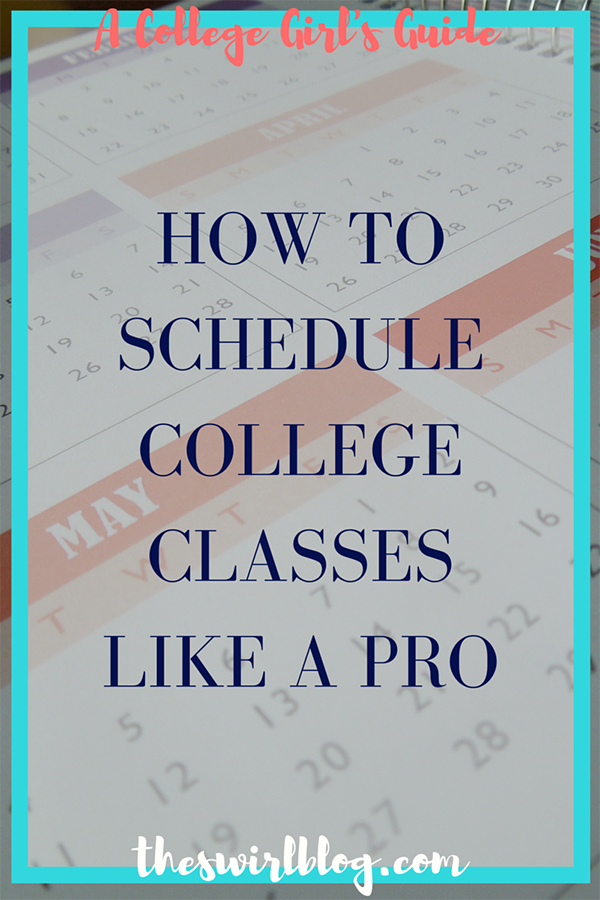
Scheduling sucks, and everyone on campus knows it. It’s stressful and can lead the calmest and most collected individuals to the brink of total mental breakdown. The source of this evil: students who have attended the school the longest get to schedule first (for most schools). So the lucky seniors who have crawled their way to the top ranks the past three years get first dibs on classes, rightfully so. However, that leaves the rest of us viciously fighting for whatever seats are left. It’s basically a test to separate those who can swim in the deep waters and those who sink under pressure. You can beat the system.
Advisors are paid to help. However, you may get some occasional-once-every-semester time to meet with your advisor, but these meetings usually focus on the big scheme of things: major choice, minors, internships, scholarships,etc. In honor of the start of orientation, I have created a handy guide with links and tips for the most underrated dilemma of the college experience: scheduling. Keep in mind that even if you don’t get the schedule that you want at first, there is plenty of time between scheduling and the first day of class to fix it! First, I’ll explain a little about how I learn more about my potential professors and then, I’ll dive right into my tips.
Professors
Your relationship with your professor is going to be soooooooo very important when taking a college course. You need someone who you feel comfortable approaching if push comes to shove and someone you are compatible with. There won’t always be someone who meets your mental checklist available, so sometimes you’ll have to suck it up and move along. But here are some sites that have reviews on professors at a lot of different institutions. You have to take these comments with a grain of salt because let’s be honest: the final grade given can either heighten the negative feedback or magically erase the semester long discrepancies. Keep in mind: every semester is different and every class is different; which can change the perspective and teaching style of a professor- positively or not so much.
- Rate my Professors
- MyEdu
- Uloop
- Koofers
- UNC Blinkness
- Upperclassmen
Making The Perfect-ish schedule
This is honestly the fun part. One of the great things about college is there are thousands of courses that they offer their undergraduate students! You can take anything from Reading Children’s Literature to Emcee Lab. You get the freedom to choose any class at any time with any professor YOU like. Some things to keep in mind:
- If you know you are not a morning person. DO NOT have 8 ams every single day of the week. I had this both semesters of my first year and if I wasn’t a morning person, it honestly would have sucked. I’ve watched too many of my hall mates (Yes, I mean you, Persis and Rayad) miss multiple classes a semester because they slept through them.
- Try and look for classes that meet more than one gen ed requirement.
- Try something you’ve never heard of or something completely new to you. You can always drop it if you need to.
- Know what gen eds your AP classes fulfill. No need in retaking courses when you don’t need to, just sayin’.
- TBA professors are typically code for “a grad student is teaching this course.”
- Take into account class locations. Good luck with getting from Graham Memorial to the School of Public Health (aka a heck of a long distance) during class change.
- You have to be a very special person to have no class on Fridays. Either you just got lucky or you have 4 classes on TTh; peace and blessings to you, my friend.
- Try and schedule around 15-17 credit hours initially. It gives you plenty of room to drop without going below the full-time status cut off.
- Memorize the drop/add policy. At Carolina, you have a whopping 5 days to add a class and 10 days to drop a class through ConnectCarolina.
- Have backups on backups on backups of a schedule you can tolerate. I think each semester I made about 4 different schedules that I wouldn’t mind having. Find classes at the same time so that if you can’t get into your first choice, you have some back ups. I use an online schedule maker to keep this all organized.
- Even if you can’t get into a class initially, don’t be afraid to find a professor. You never know, they might let you into the class or there might be a formal waitlist process that’s done through the individual department.
The key takeaway from this is:
The only way to get the perfect schedule, or one that you can tolerate, is to be prepared. You will see or may already know that the key to success in college is to always be prepared.
Relax. Even if for some reason you end up taking a bunch of random classes your first go at it, make sure they at least fulfill some of your gen ed requirements.
Don’t have enough credit hours for full time status? It gets better. I’ve seen people pull out with 17 credit hours after only having 2.
The good thing is it only gets easier from semester to semester. Until then, you just have to get used to taking the L (you’ll have multiple of them in your 4 years of college).
Are you a First Year At carolina? Keep reading.
The Devil’s Fortress Connect Carolina
ConnectCarolina is the hub of academic dealings. You can view your financial aid, the name of your advisors, and luckily schedule your classes for upcoming semesters. Now, the university knows that this process is rather daunting and it tries its hardest to explain how to use the site. The Registrar’s Office has even made a Registration Video Series that shows how to navigate through the website and how to do various functions that are vital to your scheduling success.
Gen ED ACRONYMS
The General Education requirements at Carolina are a blessing and a curse. It gives you the ability to diverge from your major and take classes that are interesting to you within each category. So maybe, even if you thought you would never take the History of Rock Music, it could end up being one of your favorite classes. Need a refresher of the pre-orientation modules and some examples? Look no farther! When scheduling, you’ll want to get very familiar with the acronyms that are used to describe the general education requirements for a degree from the university. There are 3 main categories: Foundations, Connections, and Approaches. *I recommend you screenshot this list and save it for later. I’m going to keep this handy dandy pocket guide in my agenda for easy access as well!*
*Note: Most courses are going to be 3 credit hours except for LFIT and most introductory labs which are 1 hour each. Some introductory language classes are 4 credit hours. Keep that in mind when scheduling so you won’t go over the 17 credit hour initial (before August) limit. After August, the credit hour limit in Connect Carolina increases to 18 hours. You will need to request permission to take an overload schedule through academic advising.
Foundations
- 1-course English Composition and Rhetoric (CR) ENGL 105 or 105i
- Through Level 3 of Foreign Language (FL) SPAN 101&102 (or only 105) and 203
- 1-course Quantitative Reasoning(QR) MATH 110, STOR 155
- 1-course Lifetime Fitness(LFIT) Aerobics, Cycling, Yoga
Approaches
- 2-courses Physical and Life Sciences (PL, PX)* BIOL 101/101L, GEOL 101
- 3-courses Social and Behavioral Sciences(SS,HS)** PLCY 101, HIST 140
- 3-courses Humanities and Fine Arts (PH,LA,VP)
- PH- philosophical and moral reasoning PHIL 101
- LA- literary arts CLAS 131
- VP- visual and performing arts COMM 130
*One of these courses must have a laboratory portion.
**This requirement must have courses that come from at least two different departments. One of the courses must be tagged as a historical analysis (HS) course.
Connections
- 1- course Communication Intensive (CI) BIOL 101L
- 1- course Quantitative Intensive (QI) MATH 232
- 1- course Experiential Education (EE) PHIL 261
- 1- course U.S. Diversity (US) COMM 63
- 1- course World Before 1750 (WB) CLAS 121*
- 1- course North Atlantic World (NA) CLAS 121*
- 1- course Beyond the North Atlantic World (BN) ANTH 102
- 1- course Global Issues (GL) PWAD 110
* As you can see, the one class CLAS 121, fulfills more that one general education requirement. So to maximize course efficiency, look for classes that fulfill more than one gen ed!
Note: Check out the Undergraduate Bulletin for more classes that satisfy each requirement. There is something for everyone.
Class Finder
At Carolina, you’re gonna meet some of the smartest people known to man. Some of these bright individuals created a site that is linked with the course offerings of Connect Carolina in an easy to search, user-friendly interface. The site allows you to search by keywords, gen ed acronyms, time, and class code (CHEM 101). It even allows you to see the class description that comes straight from UNC’s undergraduate bulletin. People who want good schedules use Class Finder, trust me.




